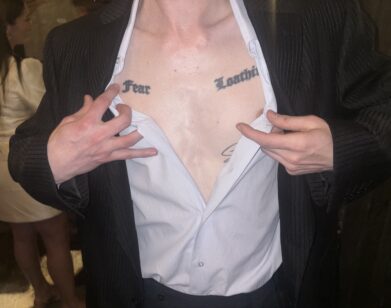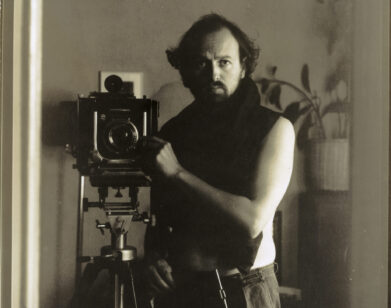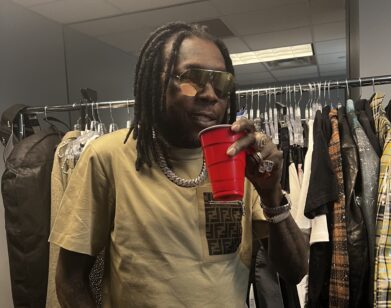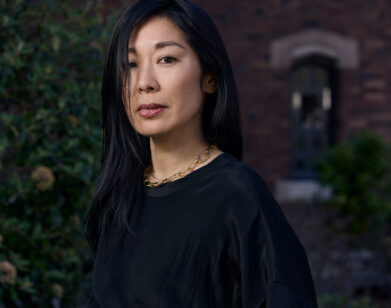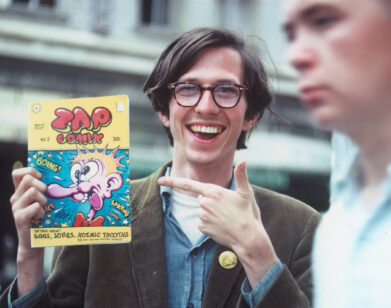Mike White Sees the Light
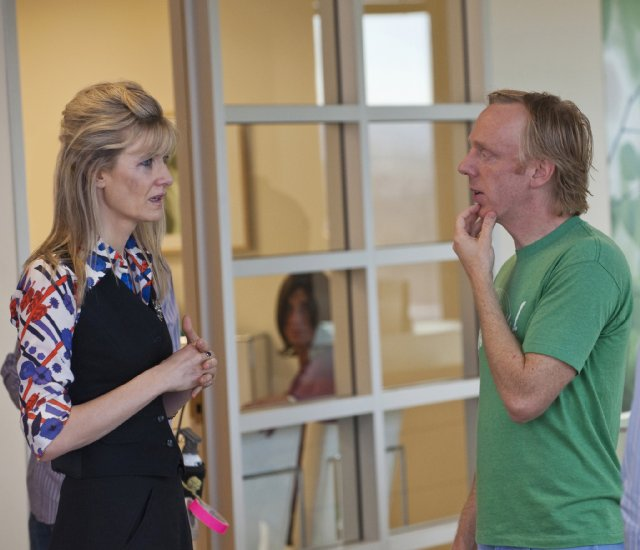
MIKE WHITE (RIGHT) WITH LAURA DERN ON THE SET OF ENLIGHTENED
IMAGE COURTESY OF HBO
Writer, director, actor, and producer Mike White has made a living earnestly depicting the arresting sincerity of offbeat characters in films like Chuck and Buck, Year of the Dog, School of Rock, and TV’s Freaks and Geeks. A two-time Amazing Race contestant, French bulldog enthusiast, and all-around indie darling, White is the creator of HBO’s new series Enlightened, a quietly funny portrait of Amy Jellicoe (Laura Dern), who is attempting to rebuild her life (and the lives of the people around her) with meditation and nature following a nervous breakdown. In addition to being executive producer, writer, and occasional director on the series, White also plays Tyler, an awkward data-processing misfit.
DEENAH VOLLMER: How are you feeling in the weeks leading up to the premiere of Enlightened?
MIKE WHITE: I feel good. There’s always a little dread when something you make comes out because everyone starts weighing in on what you’ve done, but I’ve sat with this show for so long, and I’m excited for people to see it. Yesterday I was in a cab and they were playing one of the trailers on the little TV in the cab and I was like, “This really exists. People are going to see this.”
VOLLMER: How does it compare with other TV that you’ve done?
WHITE: In a way, it’s unlike anything I’ve ever done. Most of the shows I’ve worked on have aired three times and are in the dustbin of history. I did two shows for Fox, and they’re notoriously fickle and those shows didn’t go anywhere. And on Freaks and Geeks, we were fighting to stay on the air every week. Then I did a show that premiered the week of September 11th, and it was like, forget it.
VOLLMER: Could you tell me a little bit about how this show came to be?
WHITE: Because I had such bad experiences with TV, I didn’t think I’d ever go back. I liked doing features. I did this movie with Laura Dern, and she had a holding deal with HBO, and she ended up moving a block away from me, and I kept running into her. And she was like, “I’m trying to do this show with HBO, do you have any suggestions for writers?” And after like, the fourth time, I thought, “It would be fun to party with HBO and Laura. Maybe I could do it.”
VOLLMER: Enlightened is very different from a lot of shows on TV. It’s not really a drama or a comedy. What kind of show were you trying to make?
WHITE: It’s funny, when we turned in the pilot, Mike Lombardo, the head of HBO, said, “It’s not really a comedy, is it?” And I was like, “Well, it’s definitely more dramatic than your comedies.” And he said, “It’s more dramatic than our dramas.” Sometimes when you write something on the page, it can seem very funny, but when you act it out—and this happens to me a lot, actually—the melancholy of the situation becomes more front and center. I think it is a much more emotional show than a satirical romp. In the end, it’s kind of a mini-drama. There are a lot of comedic moments, but they’re not always laugh-out-loud funny.
VOLLMER: I think that speaks to the characters. Even when they’re being ridiculous, you don’t want to laugh at them, because you are rooting for them.
WHITE: I thought it would be more subversive if you took a sincere approach to Amy’s issue.
VOLLMER: I really like those meditative breakdowns with Amy’s voiceovers.
WHITE: It’s like “Deep Thoughts of Amy.” [both laugh]
VOLLMER: People often use the word “quirky” to describe your work. What do you think about that label?
WHITE: I think “quirky” is probably apt in the sense that I enjoy things, both as a viewer and in making stuff, that is tonally in the margins, where some people come away saying, “Oh, that was so sad,” whereas others say, “That was so funny.” It’s fun as a creator to make something that allows multiple interpretations. It’s usually difficult to get that kind of thing made, because people want their comedies big and funny or they want their dramas to be operatic with lots of big plot turns. To do something that people don’t know how to take is more challenging.
VOLLMER: I love all the self-help material in the show. I find it to be both ridiculous and on point. Were you most inspired by one particular kind of self-help philosophy?
WHITE: I had my own sort of nervous breakdown like Amy does. I was working on a show and I was so exhausted and angry. I had been such a workaholic and I said, “I need more balance.” So I started doing yoga and meditating and then I then I would read these Buddhist self-help books. Have you ever heard of Pema Chodron?
VOLLMER: No.
WHITE: She writes all these—they’re actually really good—it depends on what mood you’re in, but if you just want to relax or put yourself to sleep, some of those things are useful, for me at least.
VOLLMER: Was Flow Through Your Rage, the name of the book that Amy gives to her ex-husband Levi, played by Luke Wilson, your idea?
WHITE: [laughs] Yeah. I don’t think there is a book called that.
VOLLMER: I looked it up, there’s not. [both laugh] I know you’re a big reality TV fan.
WHITE: Yes.
VOLLMER: When Amy goes on the kayak trip with Levi, it reminded me of The Amazing Race. [White laughs] And I was wondering if that was intentional.
WHITE: Oh, you mean because the teams of two?
VOLLMER: The teams of two, that they’re having this breakdown moment, and they’re racing, of course.
WHITE: I don’t know if that was conscious or not, especially since it was more low-key. There were never meditative times on The Amazing Race, but I can see the connection there.
VOLLMER: What aspects of reality TV do you try to bring into the scripted series?
WHITE: Production for movies or TV is very painstaking and slow. Part of the draw of doing The Amazing Race was how they did the production while on an adventure. It’s the opposite of a series because it’s going so fast. To me, it’s fun to try and figure out how to give a series a sense of surprise and make it feel it’s not so pre-canned, but they really are such different animals, as far as the pleasures of them. As a writer, you want authorial intent, and you want to feel there’s a big picture and it’s all mapped out, and something like The Amazing Race is all improvisational because it’s actually happening.
VOLLMER: Were there any surprising moments in the production of Enlightened that weren’t scripted, but you decided to use anyway?
WHITE: I directed the episode where they went to the Kern [river], and I also directed the pilot. They’re both field-trip episodes. We went to Hawaii for the pilot and the Kern for river rafting. Those were so fun, because everyone’s in some weird place and swimming with turtles or going down the river rapids. That was the funnest part of production. Being on the soundstage in Culver City may sound glamorous, but it’s not.
VOLLMER: How did you decide you wanted to act in the show as well?
WHITE: It makes me have another relationship to the show. Acting gives you another way to think about the show than when you’re on the outside at the monitors looking in. As a writer, it’s fun to be interacting with the other characters inside of the world you created.
VOLLMER: Was that dynamic ever a challenge, to be in that moment as an actor when you’re also thinking about all the other elements of production?
WHITE: There were times when another director was directing the episode and I was like, “What hat am I wearing?” As an actor, I like to let go of the controlling side of it and give in. At the same time, there’s moments when you’re like, “I am the executive producer and are the trains going off the tracks and I just have a front row seat for it.” When you’re interacting with the other actors, I wonder if I’m interacting as just another actor or as the creator. It sometimes gets a little confusing, but it wasn’t too bad.
VOLLMER: You seem to have perfected the awkward smile. It’s executed very well during some of the comic moments in the show. Is that smile something you’ve practiced or is it just something you do?
WHITE: I don’t know, but I’ve noticed that I like to create moments between characters where they’re silent, the awkward moment between two people. That’s why I liked The Hills so much, because it always seemed like every scene ended with a quiet back and forth. They just would go from Audrina looking vacant to Bobby looking vacant back at her and the scene would end.
VOLLMER: Diane Ladd plays Amy’s mother and is Laura Dern’s mother in real life. They’ve done that before in Wild at Heart. Was that Laura’s idea or yours?
WHITE: I’ve always been a fan of Diane’s and I also thought it might come up because we were creating a mother and her mom was a three-time Academy Award-nominated actress. But Laura was really into the idea of working with her mom, too. It’s different, because most of the time Diane plays these larger-than-life mothers, and the mother in this show is really restrained and shut down. It’s certainly not Diane in real life, and it was an interesting dynamic for her to be more of the shut-down, quiet one.
VOLLMER: She’s great. I noticed she has a dog named Ginger in the show, and you have a dog named Ginger too.
WHITE: I know, it’s hard to believe. The character in the show was not originally named Ginger, but the dog we hired was named Ginger. Diane was just like, “I’m going to call it by its name, I’m just going to call it Ginger.” And I was like, “Everyone I know is going to think that’s a shout out to my dog.” But it’s totally a coincidence.
VOLLMER: [laughs] I definitely thought it was deliberate, but I’m glad that the dog gets to be called its name.
WHITE: Exactly.
VOLLMER: Ginger’s a good name for a dog. I hope it didn’t make you feel less original.
WHITE: It made me feel like, why am I not just using the real Ginger?
VOLLMER: Have you ever tried to use your dogs?
WHITE: Yeah, but it’s not allowed. You have to have trained dogs in movies.
VOLLMER: Is there a dog union?
WHITE: Well, when I did Year of the Dog, we used all of these dogs, and I was like, oh, just put my dogs in there. And they were like, “No, the trained dogs can’t interact with them.” I also took birds, she has these birds in the show, and I have them at my house. They’re my birds now.
VOLLMER: What are their names?
WHITE: Russell and Parvati, from Survivor.
VOLLMER: You’re allowed to keep the birds?
WHITE: Well, because birds aren’t trained, they’re just bought at a store.
VOLLMER: Okay, so you can have regular birds on TV.
WHITE: You can have flaming birds.
VOLLMER: So what was it like working with Travis Heaps?
WHITE: [laughs] He’s one of the finer actors I’ve ever worked with. Travis plays Christa’s husband, and even though he’s in a couple of episodes, he only has one line. He says, “We still party.” And so he made shirts for everybody that has “We still party” on it, which is a great shirt to wear. I really like the shirt. I almost wore it today. But that line ended up getting cut out of the show. I still haven’t told Travis yet.
VOLLMER: I guess he’ll find out now. One of the taglines for Enlightened is “Find your joy.” What gives you joy?
WHITE: My dogs… my dogs… my dogs. You know, I can get off on a lot of different things, but right now I get joy from being not so busy. It’s exciting to work, and then you’re like, “I just want to be free.” I have a little bit of downtime right now before possibly the show goes back. Just to have a day where you’re like, “I can do whatever the heck I want and I don’t have to answer to anybody,” that’s, to me, is the definition of joy right now.
VOLLMER: Are you going back to Hawaii?
WHITE: I’ve been twice this year. In fact, I went and swam with the turtles.
VOLLMER: Because you met them filming the pilot?
WHITE: It was a different part of Hawaii, but there are turtles all over. It is a cool experience, to swim with wild animals. We did it when we were shooting the pilot. Dave Bernad [producer], the costume designer, and I swam with these pods of dolphins that were just out in the ocean. It was definitely the coolest moment.
VOLLMER: Did you have an “Enlightened” moment?
WHITE: It was like, the world may be falling apart, but I still got to swim with the dolphins, so it can’t be all bad.
ENLIGHTENED PREMIERES MONDAY ON HBO.

